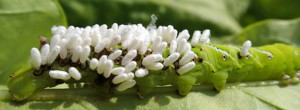Actually, yes! They may not make honey like pollinating bees do, but we still need them. Even though you might tend to think of wasps as pesky stinging insects, they do provide ecological benefits.
Similar to bees, some species are helpful with pollination. For instance, the fig wasp, Blastophaga psenes, has a mutual relationship with the common fig (Ficus carica). The wasp larvae develop within the figs’ ovaries, and the fig tree depends on the wasps for pollen transfer.
Several wasp species also help to eliminate pests. Adult mason wasps (Zethus spp.) (Figure 1) collect moth larvae for their nests in order for their wasp larvae to be fed. The moth larvae collected are generally considered pests, as some of them can defoliate trees.
Many wasps are parasitoids, meaning the eggs or larvae live on or within their host (“parasitizing” it) and will eventually kill the host. An example of a beneficial parasitoid wasp is Diachasmimorpha longicaudata, which lays its eggs in Caribbean fruit fly (Anastrepha suspensa) larvae—a major fruit fly pest of tropical fruits—and when the wasp larvae hatch, they feed on the fly pupae. Other parasitoid wasps acting as biological control insects include Anagyrus pseudococci (controls mealybugs), Cotesia congregata (controls tobacco hornworms) (Figure 2), and Utetes anastrephae (controls West Indian fruit fly).
Figure 1. Adult mason wasps, Zethus slossonae. Photograph by Sean McCann, University of Florida.
Figure 2. Parasitoid wasp, Cotesia congregate, pupae on its host, a tobacco hornworm, Manduca sexta. Photograph by Justin Bredlau, Virginia Commonwealth University.
So, as you can see, some wasp species are not problematic to people at all!
This guest post authored by Shari Linn.
 0
0


